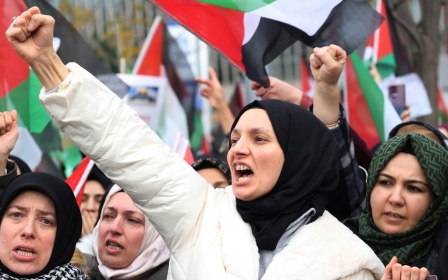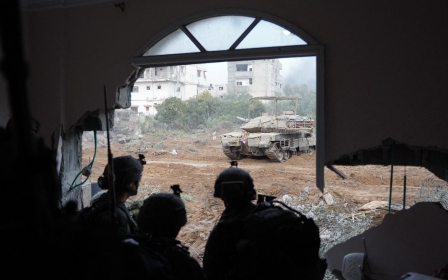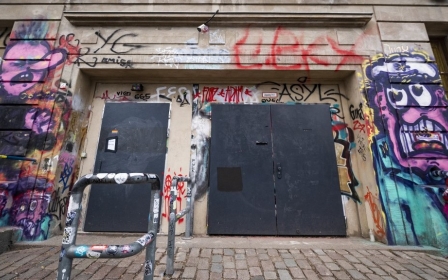War on Gaza: British gynaecologist describes scenes of horror in hospitals

A British gynaecologist and obstetrics doctor has described scenes of horror in the al-Aqsa Martyrs Hospital in Gaza after spending two weeks volunteering there, in a CNN interview on Thursday.
The hospital, located in the Deir al-Balah area of Gaza, is one of the only remaining partially functional hospitals left in the enclave, due to sustained Israeli bombing and the cutting off of fuel supplies since the start of the war on 7 October.
Deborah Harrington was volunteering with British charity Medical Aid for Palestinians (MAP), where she helped women and children in the hospital.
Speaking to Christiane Amanpour, she said that the hospital was severely overwhelmed with patients, emergencies, and trauma cases.
“It was all at a level that the hospital was simply not equipped to deal with, it had swollen with massive numbers of patients and displaced people,” she explained.
According to Harrington, there were around 600 to 700 inpatients while she was there, as well as more emergency cases coming in every day.
“What I overwhelmingly saw was children, and one day, it was New Year’s Day, and I looked at my watch and it was around 2pm, and there was mass casualties coming in from a school shelter which had been bombed and blasted,” she said.
'The other children all had a horrendous mix of open fractures, partial amputations, open chest wounds'
- Deborah Harrington, gynaeocologist
Out of the five patients she dealt with, four of them were children, one with a “horrendous” shrapnel injury to the brain.
“The other children all had a horrendous mix of open fractures, partial amputations, open chest wounds, horrendous lacerations, shrapnel in the chest and head, and burns, and that was every day in the emergency department.
"My overall impression was why are there so many children here?”
Harrington also said that as well as the constant streams of casualties coming in, many people were also brought in dead, something she said she didn’t expect to see.
While at the hospital, Harrington said the charity she was working for was co-ordinating with staff and the Israeli army to ensure they were safe, however there were several instances where the vicinity of the hospital suddenly became a "red zone" and was subjected to Israeli attacks.
Targeting hospitals
When asked if there were any Hamas members in the hospital or in its vicinity, Harrington said there was “certainly no one she could identify as Hamas” in the area and there was no one dressed in anything that resembled army clothing.
Another major challenge Harrington says she faced was Israeli forces sending back or not approving vital aid deliveries for Gaza.
“We did see trucks that were sent back, and one that stuck with me was a large truck of baby’s nappies that were sent back to the Rafah border,” she said.
Women, she added, are some of the worst affected, as they have no antenatal care and anaemia is a significant problem across the board in Gaza even in non-war times, which had only worsened since 7 October.
The lack of medical supplies, coupled with the spread of infection, made treating patients more difficult for hospital staff.
“If you’re anaemic and you bleed during the time of your birth, you can die because you haven't got the reserves,” she explained.
'I just feel ashamed and shocked that we’re doing this to fellow humans'
- Deborah Harrington
As women became more vulnerable, stillbirths and miscarriages also became more common, as well as women delivering prematurely.
One woman, Harrington said, came in with seizures, and arrived unconscious and her baby was delivered through C-section; however, she ended up with a haemorrhage due to the lack of care.
“This is just one of thousands of stories, many women can’t even reach a hospital and that’s because there is no transport, [no] electricity, and it is dangerous, they can’t even call an ambulance because there’s no signal.”
Harrington described Israel's attacks on hospitals as “systematic dismantling,” calling for them to be protected, adding that the humanitarian response has been inadequate.
“I just feel ashamed and shocked that we’re doing this to fellow humans,” she said.
Middle East Eye propose une couverture et une analyse indépendantes et incomparables du Moyen-Orient, de l’Afrique du Nord et d’autres régions du monde. Pour en savoir plus sur la reprise de ce contenu et les frais qui s’appliquent, veuillez remplir ce formulaire [en anglais]. Pour en savoir plus sur MEE, cliquez ici [en anglais].




